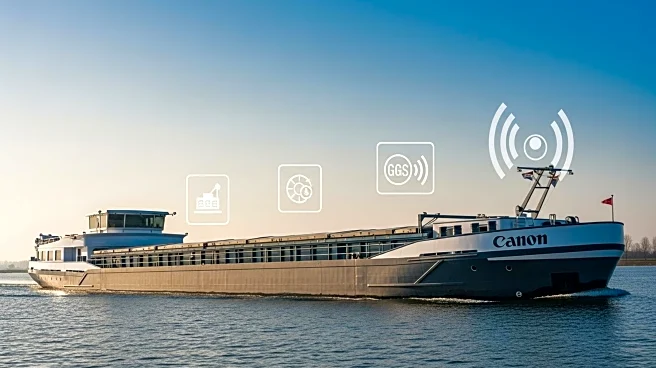What's Happening?
The inland barge industry is undergoing a transformation with the introduction of BargeOS, a platform that provides real-time visibility and intelligence for barge operations. This development addresses the longstanding issue of operational blind spots in the industry, which have historically led to inefficiencies and financial losses. BargeOS offers satellite-connected GPS tracking and AI-driven predictive analytics, allowing operators to monitor barge positions and status in real-time. This capability enables better fleet management, reduces manual data entry, and provides a single source of truth for voyage data. The platform also integrates with customer systems, offering APIs for seamless data incorporation into logistics management systems. This transparency and integration are crucial in today's competitive transportation market, where customers prioritize reliability and transparency over cost.
Why It's Important?
The implementation of BargeOS is significant for the U.S. logistics and transportation sector, particularly for the inland barge industry. By enhancing operational visibility, the platform helps operators optimize asset utilization, reduce idle time, and improve service reliability. This can lead to increased revenue through additional voyages and better customer retention. The ability to predict potential disruptions and adjust schedules proactively is a competitive advantage, especially in an industry affected by volatile conditions such as weather and river levels. Furthermore, the integration capabilities of BargeOS position operators as sophisticated supply chain partners, enhancing their role beyond mere transportation providers. This shift is crucial as the industry moves towards more digitized and efficient supply chain solutions.
What's Next?
As BargeOS continues to be adopted, operators can expect to see improvements in operational efficiency and customer satisfaction. The platform's ability to provide real-time data and predictive analytics will likely lead to more informed decision-making regarding routing, scheduling, and capacity allocation. This could result in a more resilient and responsive barge transportation network. Additionally, as more operators embrace this technology, the industry may see a shift towards more sustainable and efficient freight transportation solutions. The success of BargeOS could also inspire similar innovations in other transportation modes, further advancing the digitization of supply chains.
Beyond the Headlines
The introduction of BargeOS highlights the growing importance of digital transformation in traditional industries. The platform not only improves operational efficiency but also fosters trust and transparency between operators and customers. This shift towards digital solutions reflects broader trends in the logistics sector, where data-driven decision-making and customer-centric approaches are becoming increasingly vital. As the industry continues to evolve, the ethical and cultural implications of such transformations, including data privacy and the role of technology in human decision-making, will need to be considered.










